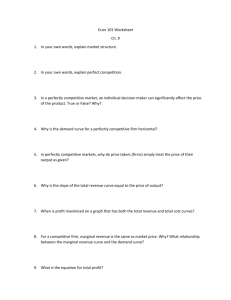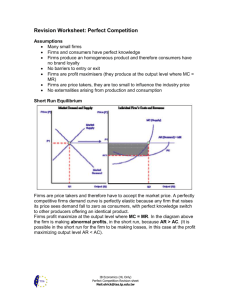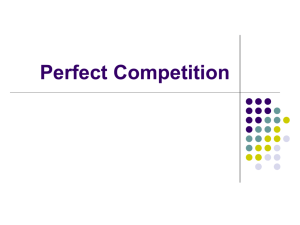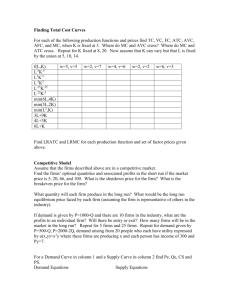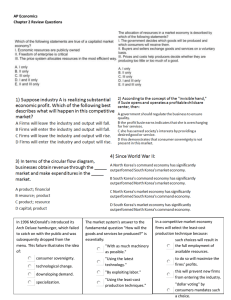Laugher Curve
advertisement
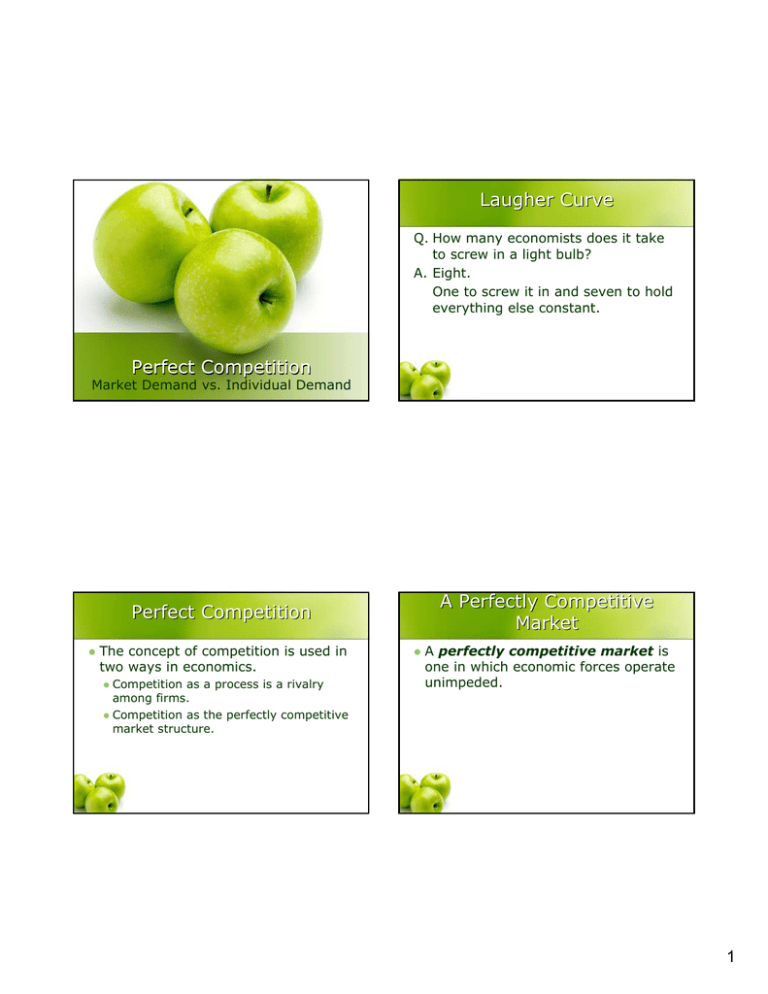
Laugher Curve Q. How many economists does it take to screw in a light bulb? A. Eight. One to screw it in and seven to hold everything else constant. Perfect Competition Market Demand vs. Individual Demand A Perfectly Competitive Market Perfect Competition z The concept of competition is used in two ways in economics. Competition as a process is a rivalry among firms. z Competition as the perfectly competitive market structure. z z A perfectly competitive market is one in which economic forces operate unimpeded. 1 A Perfectly Competitive Market z A perfectly competitive market must meet the following requirements: The Necessary Conditions for Perfect Competition z A price taker is a firm or individual who takes the market price as given. z In most markets, households are price takers – they accept the price offered in stores. z Both buyers and sellers are price takers. z The number of firms is large. z There are no barriers to entry. z The firms’ products are identical. z There is complete information. z Firms are profit maximizers. z The Necessary Conditions for Perfect Competition z Both buyers and sellers are price takers. z z The retailer is not perfectly competitive. A retail store is not a price taker but a price maker. Both buyers and sellers are price takers. The Necessary Conditions for Perfect Competition z The number of firms is large. Large means that what one firm does has no bearing on what other firms do. z Any one firm's output is minuscule when compared with the total market. z 2 The Necessary Conditions for Perfect Competition z There are no barriers to entry. The Necessary Conditions for Perfect Competition z There are no barriers to entry. z Barriers to entry are social, political, or economic impediments that prevent other firms from entering the market. z Barriers sometimes take the form of patents granted to produce a certain good. Technology may prevent some firms from entering the market. z Social forces such as bankers only lending to certain people may create barriers. The Necessary Conditions for Perfect Competition The Necessary Conditions for Perfect Competition z z The firms' products are identical. z This requirement means that each firm's output is indistinguishable from any competitor's product. z There is complete information. Firms and consumers know all there is to know about the market – prices, products, and available technology. z Any technological breakthrough would be instantly known to all in the market. z 3 The Necessary Conditions for Perfect Competition z Firms are profit maximizers. The Definition of Supply and Perfect Competition z The goal of all firms in a perfectly competitive market is profit and only profit. z The only compensation firm owners receive is profit, not salaries. z The Definition of Supply and Perfect Competition z Supply is a schedule of quantities of goods that will be offered to the market at various prices. If all the necessary conditions for perfect competition exist, we can talk formally about the supply of a produced good. The Definition of Supply and Perfect Competition z When a firm operates in a perfectly competitive market, it’s supply curve is that portion of its short-run marginal cost curve above average variable cost. 4 Demand Curves for the Firm and the Industry The demand curves facing the firm is different from the industry demand curve. z A perfectly competitive firm’s demand schedule is perfectly elastic even though the demand curve for the market is downward sloping. z Demand Curves for the Firm and the Industry z Individual firms will increase their output in response to an increase in demand even though that will cause the price to fall thus making all firms collectively worse off. Market Demand Versus Individual Firm Demand Curve Price $10 Market Market supply Firm Price $10 8 8 6 6 4 Market demand 2 0 1,000 3,000 Quantity Individual firm demand 4 2 0 10 20 30 Quantity 5
